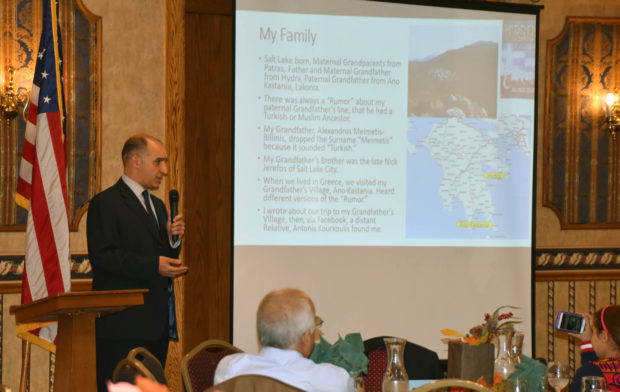- Leading HANAC: Stacy Bliagos on Community Service in New York
- The Hellenic Initiative Celebrates Record-Breaking Weekend in New York
- Building the Future: HANAC’s 53rd Anniversary Gala Honors Advocates for Affordable Housing and Community Care
- Leona Lewis: Las Vegas residency ‘A Starry Night’
- Emmanuel Velivasakis, Distinguished Engineer and Author, Presents His Book at the Hellenic Cultural Center
The Case for Cultural Literacy

Alexander Billinis
On Sunday, October 29, 2017 I had the singular pleasure of addressing members of the Hellenic Cultural Association of Salt Lake City, Utah. For a Utah Greek boy long away from his home community, this was a great honor to talk about my latest book, but in the context of knowing both our personal and ethnic history.
I applaud the efforts of my friends at the Hellenic Cultural Association and other similar minded entities throughout the US, Greece, and elsewhere in the Greek Diaspora. I had the honor of serving as a Board Member for Hellenic Link-Midwest in Chicago, and I presented lectures at Chicago’s incomparable National Hellenic Museum. There are several other excellent organizations I know of or have worked with in the US and Greece, and all are dedicated in some way to promoting cultural literacy within our community.
I believe strongly that now is the time for a bottom up initiative dedicated to expanding the cultural knowledge base of Greek Americans. Our community is large, diverse, well-educated and sophisticated, and includes so many people who are well removed from Greece or have assimilated Greek culture peripherally via marriage or partial ancestry. I have witnessed a great deal of interest from people watching my lectures or reading my articles. The interest is not just for a cursory examination of Greek history, but for a deeper dive into the totality of this vast and complicated inheritance. “I never thought about it this way . . .” is a common refrain, or “This discussion put the role of Byzantium in our heritage in perspective.”

Alex Billinis at Hellenic Cultural Association of Salt Lake City, Utah, October 29, 2017. Photo by Barbara Colessides
The importance of cultural literacy goes beyond intellectual curiosity. As we are further removed from Greece, the accoutrements of history, culture, and traditions serve as key markers for our identity. The vastness of Greek history and culture literally has something in it for everyone, but I would suggest that the millennium-plus legacy of Byzantium is the most relevant and profound part of our history. Particularly for converts to Orthodoxy, the immense absorptive power of Byzantium, which took in Levantines, Slavs, Romanians, Italians, and even Anglo-Saxons (such as the Varangian Guard) should be, if anything, the tie that binds. As I look at our new parish, in Greenville, South Carolina, it is full of converted Americans, Levantine Arabs, Romanians, and Russians. Byzantium is surely more of a bond than ancient Greece.
The Byzantine legacy ties us to the other Balkan countries in particular; Serbs, Bulgarians, Slav Macedonians, and Romanians share our faith, our culture, and we have so much common history. These ties are important and should be fostered, as it strengthens our “numbers” here at home and helps to foster those same ties “back home” where Greece, Bulgaria, and Serbia have very strong political, cultural, economic, and, in the face of the Turkish threat, military ties.
Even the Turkish legacy is far from understood, except in highly negative terms. Most Greeks know—or want to know—little about this era, yet this nearly half millennium is vital to an understanding of Greece today, and it too merits attention and study beyond just a universal condemnation. We risk coming off as biased and uniformed if we do not understand our history as a totality rather than just one of soundbites and headlines.
This sounds complicated, and who has time for such study? Fair point, and yes, the material is vast and complicated. At the same time, many of the finer points can be distilled in a few slides, articles, and lectures. The point is to build awareness, to start conversations currently not being had. What was the role of Byzantium? Why do we never hear about the Byzantines? What happened during the Turkokratia (the Turkish occupation)? Why are these things relevant to us today, either in Greece or abroad?
From there, we need to rely on an engaged audience, a literate one, which will follow up with their own study to draw their own conclusions. Our community is well educated and in my experience, eager to learn about the totality of Hellenic history. In fact, if anything, the more removed the person from Greece, the more often there is this need to connect, at least intellectually, with Greece’s history and heritage.
Most of us in the Diaspora have Hellenism in our hearts, it is time to bolster the Hellenism in our minds. Cultural literacy programs set the ball in motion, and from there, an erudite and literate crowd will do the rest.











0 comments